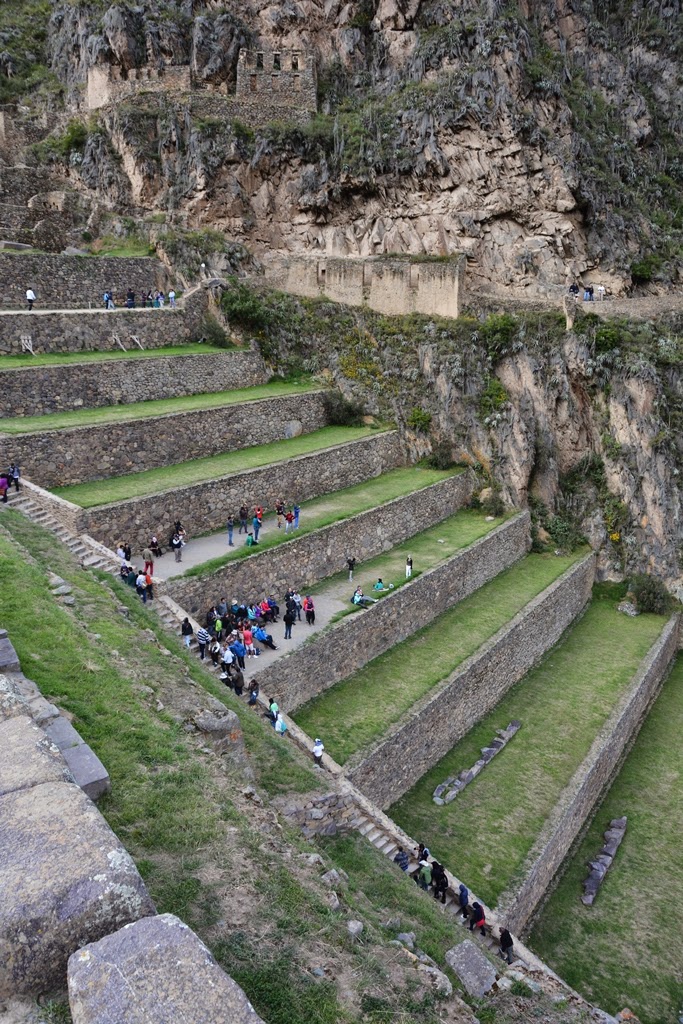What an amazing Inca site Ollantaytambo has. The terraces had an agricultural function like everywhere in Peru. This major complex had mainly a religious function and has never been completed. This is visible at the back of the mountain where we still see a handmade ramp to pull large rocks up the mountain.
We liked this site so much because of its beautiful ruins and hiking trails. It is just fantastic to look down on the terraces and walk on the narrow dirt paths. In the lower part of the Inca complex there are still a few temples with streaming water.
Due to the steep terraces and being surrounded by mountains, this Inca site had a strategic defense location. The Spanish conquistadors had heard of the Inca city of Machu Picchu and were going to destroy it like all the others. To reach Machu Picchu, just like today, you have to pass via Ollantaytambo.
The last Inca King Manco blocked the access road to Machu Picchu via this fortress, it has hidden for the invaders. They had two choices, defeat the Inca's at Ollantaytambo by taking the fortress or continue their search for Machu Picchu going east or west alongside Ollantaytambo. After a long fight and several defeats this is what they did.
Continuing alongside the Urubamba River they could not see Machu Picchu hidden behind the trees of the tropical forest in the mountains. Making their way to the right, through the jungle, most conquistadors got sick and died. Their biggest weakness was getting ill from the altitude. A whole Spanish regiment searched 34 years for Machu Picchu and couldn't find it. Eventually Ollantaytambo fell but today’s most famous Inca city Machu Picchu was never discovered by the colonists.
Wat een verbluffend Inka complex vinden we hier in Ollantaytambo. De terrassen hebben een landbouwfunctie net zoals overal in Peru. Oorspronkelijk was dit een religieuze plaats maar deze werd nooit volledig afgewerkt. Dit is zichtbaar aan de achterkant van de berg waar nog een man gemaakte helling ligt voor het naar boven trekken van bouwstenen.
Deze site trok ons zeer sterk aan vanwege de mooie ruïnes en wandelpaden. Het is gewoon fantastisch het complex beneden te zien van op een smal aarde pad. In het lager gelegen gedeelte van het complex staan nog enkele tempels met stromend water.
Door de steile terrassen omringt door bergen was deze Inka site een strategische verdedigingsplaats. De Spaanse veroveraars hadden gehoord over Machu Picchu en gingen ook deze stad vernietigen zoals alle andere. Net zoals vandaag, moest men via Ollantaytambo passeren vooraleer Machu Picchu te bereiken.
De laatste Inka koning Manco blokkeerde de weg naar Machu Picchu met deze vestiging, de stad was verborgen voor de invallers. Ze hadden twee keuzes om Machu Picchu te bereiken, via de linker en rechter zijde van Ollantaytambo. Na een lang gevecht gingen ze inderdaad verder langs beide wegen.
Hun weg makende via de Urubamba Rivier konden ze Machu Picchu niet zien dat verborgen lag in de bergen achter bomen van het tropische regenwoud. Langs rechts moest men door het oerwoud en de meeste Spanjaarden lieten het leven. Hun grote zwakte was hoogteziekte. Het Spaanse regiment zocht 34 jaar in het oerwoud en kon Machu Picchu niet vinden. Later viel Ollantaytambo toch onder de aanvallen maar de meest beroemde Inka Site ter wereld, Machu Picchu werd nooit gevonden door de kolonisten.
Previous Ollantaytambo article:
Ollantaytambo town, one of the oldest cities of South America
Previous Temple article:
The Inca IntihuatanaTemple of Sacred Valley
Return to main page
The Great Outdoors
20 hours ago




















































